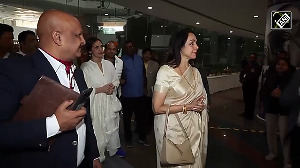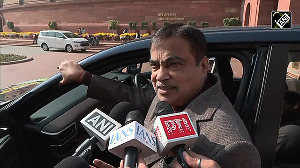To the extent the nuclear race in West Asia is slowed down by the Iran nuclear deal, the world as a whole has reason to be happy, says Virendra Kapoor.

Trust is a key element in any negotiation, especially between estranged nations.
A deficit of trust had caused both sides negotiating a nuclear deal in Lausanne, Switzerland, to thrash out the minutest possible details before they could reach an agreement.
Iran and the P5 + 1 (the US, the UK, Russia, China and France plus Germany) were engaged in extended and intensive talks with the objective of capping the Iranian nuclear programme, while Iran was desperate to ease the crippling economic and political sanctions. But after crossing the self-imposed March 31 deadline for clinching a deal, the doggedness of the rival interlocutors finally produced an agreement on Thursday, April 2.
The world at large has reason to be optimistic at the prospect of reduced tensions in the always volatile West Asia. Iran is also a major player in the ongoing wars in the entire region.
Barbaric ISIS militias in Turkey, Syria and Iraq, and the sectarian wars in Yemen, where the Saudis entered the fray last week, have indeed made the Middle East the most dangerous place on Earth.
Should Iran play ball with the international community following the provisional nuclear deal, which is to be signed and sealed by end-June, the danger of a wider conflagration could be lessened somewhat. It is so because given the inherent Sunni-Shia animosities within Islam, there can never be complete peace in the Middle East.
Indeed, if by some miracle Israel were to reach a peace agreement with the Islamic world, the latter would still remain on edge because multiple sectarian wars within Islam go as far back as Islam itself.
As for the nuclear deal, it is to the credit of US President Barack Obama that he did not waver from his commitment to try and bring Iran to the negotiating table. It is a big feather in his foreign policy cap. He was helped by the change of guard in Teheran when the hardliner Mahmoud Ahmadinejad was succeeded by a pragmatic Hassan Rouhani as president.
Initial links were established soon after Rouhani assumed office, with Obama phoning him while he was attending the UN General Assembly meeting in 2013. Stringent global sanctions hurt the ordinary Iranians, with the economy facing shortages and high inflation. Even otherwise, ordinary Iranians were not ill-disposed towards the West, despite the vicious rhetoric of Islamic fundamentalists.
It is notable that the ordinary people celebrated the news about the Lausanne agreement on the streets of Teheran, though hardliners could still try and create problems. Under the agreement, Iran would reduce the number of centrifuges used for enriching uranium from over 19,000 to less than 6,000, and open its nuclear facilities for inspections by the International Atomic Energy Agency.
Also, the nuclear-grade uranium already enriched would be stored at a safe place under IAEA supervision. For the next 15 years, Iran will not enhance its enrichment facilities and will not enrich uranium above 3.67 percent purity.
Thus, the 'break-out' time, that is, the time for Iran to renege on the deal and go nuclear, would now be at least a year instead of the current two to three months. In return, the West, including the UN and the EU, will lift sanctions, and get the UN to deactivate the Iran-centric resolutions. Iran will now be able to resume exports of its petroleum products freely.
Not only has India welcomed the agreement but in a clever move decided to dispatch a senior commerce ministry official to Teheran to boost economic ties.
Yes, there could be problems for the deal both on Capitol Hill and in Teheran where in an early reaction the hardliners have called it a 'sell-out.'
President Obama is not obliged to heed the jingoistic elements in Congress who have threatened to nix the deal. The liberal and middle-of-the-road majority backs Obama on the agreement, especially at a time when ordinary Americans have lost the appetite for policing an increasingly troublesome world outside their own borders.
After his big win in the recent election, Israeli Prime Minister Benjamin Netanyahu may have toned down his intransigence, though for the record, he will continue to oppose the agreement.
The deal should reduce the anxiety of the Saudis and other Sunni nations worried about Iran acquiring what they dub as a 'Shia bomb'. To the extent the nuclear race in West Asia is slowed down by the deal, the world as a whole has reason to be happy.
It is any day a better agreement than a no-agreement. It should induce Iran to behave as a responsible member of the comity of nations, it is hoped.
Image: Iranians give the V-sign on the streets of Tehran following the deal with the West.










